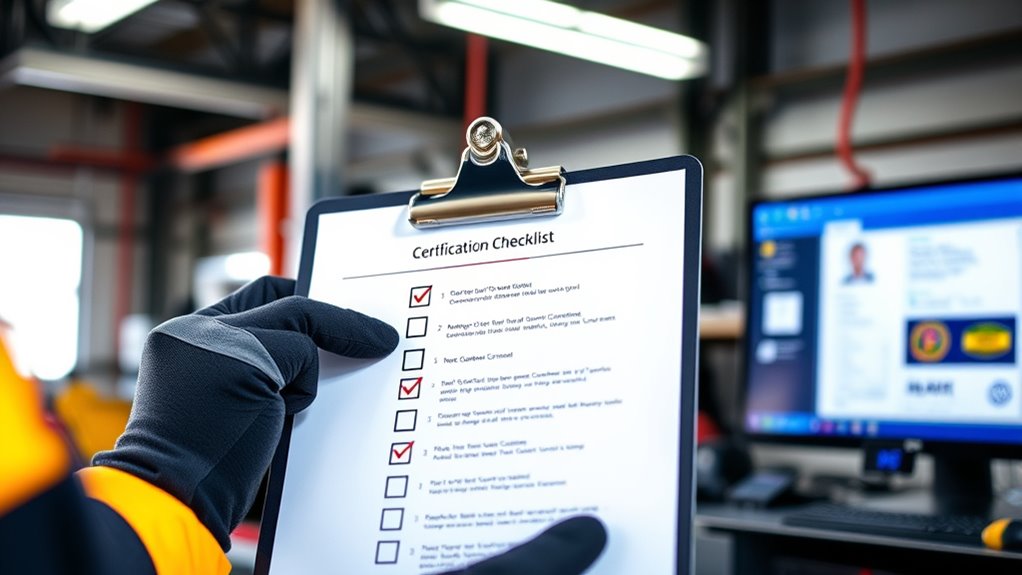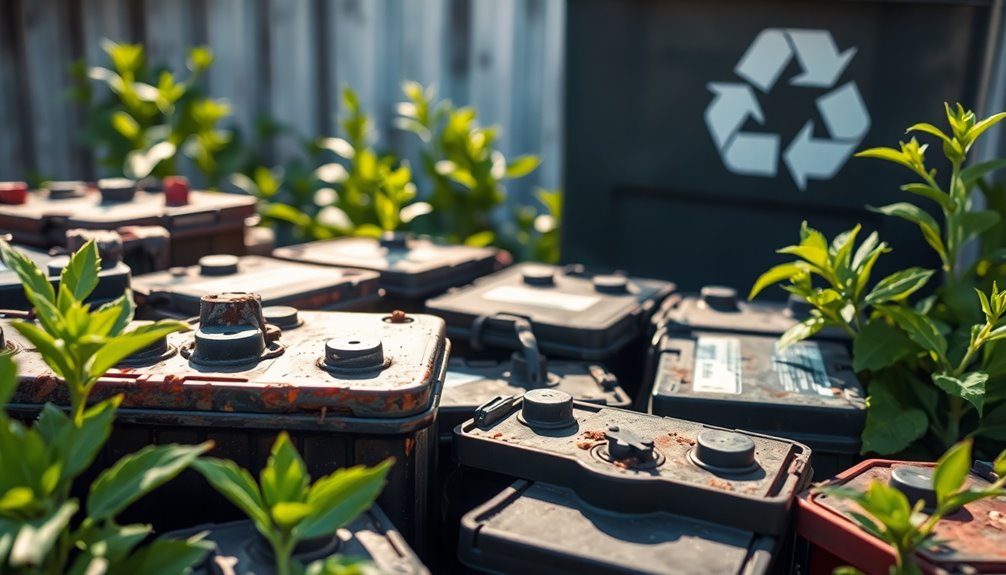To verify your technician is truly qualified, check that their certification is current and meets industry standards. Confirm they have completed ongoing education credits, provided proof of recent work experience, paid renewal fees, and passed any required refresher exams. Staying updated with evolving safety protocols and industry benchmarks is essential. If you want to make sure you’re hiring a fully qualified professional, there’s more to consider—continue exploring to learn what you need to verify.
Key Takeaways
- Verify that the technician’s certification is current and has been renewed according to industry standards.
- Ensure they have completed all required continuing education credits and documented ongoing training.
- Confirm they meet the latest industry standards and safety protocols applicable to their certification.
- Check that they have submitted all necessary renewal documentation and paid applicable fees on time.
- Assess their recent work experience to ensure it aligns with current certification requirements and standards.

Are you prepared to navigate the certification process smoothly? Understanding the renewal requirements and aligning with industry standards is essential to guaranteeing your technician remains qualified and compliant. Certification isn’t a one-and-done deal; it’s an ongoing commitment that demands regular updates and adherence to evolving standards. To stay ahead, you need a clear grasp of what renewal involves and how it ties into the broader expectations within your field. Most certifications have specific renewal requirements, which often include completing continuing education, submitting proof of ongoing experience, or paying renewal fees. Failing to meet these requirements can mean losing your certified status, which could impact your credibility and job prospects.
Understanding renewal requirements and industry standards is key to maintaining your certification and professional credibility.
It’s vital to stay informed about the latest industry standards that influence certification renewal. Industry standards are the benchmark for safety, quality, and professional competence in your field. They evolve as new technologies emerge and safety protocols improve, so your certification must reflect these changes to remain valid. Regularly reviewing updates from certifying bodies ensures you’re meeting current standards and not operating with outdated knowledge. Many organizations provide resources, such as webinars or updated guidelines, to help you stay aligned with industry standards. Incorporating these into your ongoing education shows your commitment to professional growth and competence.
As you approach renewal time, gather all necessary documentation beforehand. This typically includes proof of completed continuing education, updated work experience logs, or certificates from training programs. Some certifications also require passing an exam or completing a refresher course. Check the specific renewal requirements outlined by your certifying organization to avoid surprises or delays. Many certifications offer a grace period for renewal, but it’s wise to act well before your expiration date to prevent lapses. Staying proactive ensures your certification remains current, and your skills stay sharp. Furthermore, understanding projector technology can give you an edge in related fields, emphasizing the importance of staying updated across industry advancements.
Beyond meeting renewal requirements, maintaining awareness of industry standards helps you provide top-tier service and stay competitive. Certifications that reflect current industry standards demonstrate your dedication to quality and safety, which clients and employers value highly. It also minimizes the risk of penalties or disqualification due to outdated practices. Regularly reviewing certification guidelines and participating in industry-specific training sessions safeguard your professional credibility. Ultimately, keeping up with renewal requirements and industry standards isn’t just about maintaining status; it’s about investing in your career, ensuring you’re always prepared and qualified to serve your clients effectively.
Frequently Asked Questions
How Often Should Technician Certifications Be Renewed?
You should renew your technician certifications as often as renewal requirements specify, typically every one to three years. This guarantees your certification remains valid and up-to-date, reflecting current industry standards and practices. Failing to renew on time can compromise certification validity, possibly requiring retesting or additional training. Stay proactive by tracking renewal deadlines, and regularly check for any updates to certification requirements to maintain your professional credentials seamlessly.
Are Online Certification Programs as Valid as In-Person Training?
You might wonder if online certification programs hold the same online credibility as in-person training. While virtual training offers flexibility and can be equally thorough, its validity depends on the program’s accreditation and industry recognition. Confirm your chosen online courses are reputable, meet certification standards, and provide practical assessments. When these factors align, online certifications can be just as valuable, helping you stay qualified and competitive in your field.
What Specific Certifications Are Required for My Industry?
You need to know the industry standards and certification types relevant to your field. Check if your industry requires specific certifications, like OSHA for safety or CISSP for cybersecurity, to guarantee compliance. Research recognized certifying bodies and verify their credibility. Your goal is to meet or exceed industry standards, demonstrating your skills and knowledge. Staying current with certification requirements helps you stay competitive and ensures your technician is genuinely qualified for the job.
Can Uncertified Technicians Perform the Same Work Legally?
You might wonder if uncertified technicians can perform the same work legally. Generally, licensing requirements vary by industry and location, and working without proper certification can lead to serious legal implications. In many cases, only licensed or certified technicians are allowed to perform certain tasks. To stay compliant and avoid penalties, confirm your technicians meet all licensing requirements, as working without certification could jeopardize your business’s legal standing.
How Can I Verify a Technician’S Certification Authenticity?
You might think certification verification is complicated, but it’s vital for ensuring your technician’s certification validity. To verify, check with the issuing agency or use their online verification tools. Don’t rely solely on a badge or document—confirm the certification’s current status. This process helps you confidently determine if your technician is truly qualified, avoiding potential legal or safety issues caused by unverified or expired certifications.
Conclusion
Now that you know what to look for, you can confidently verify your technician’s qualifications. For example, a homeowner once hired a non-certified electrician who caused costly delays. After checking credentials, they found a certified professional, guaranteeing the job was done right the first time. Always use this checklist to protect your investment and ensure safety. Remember, a qualified technician isn’t just about the badge—they’re about delivering quality work you can trust.










